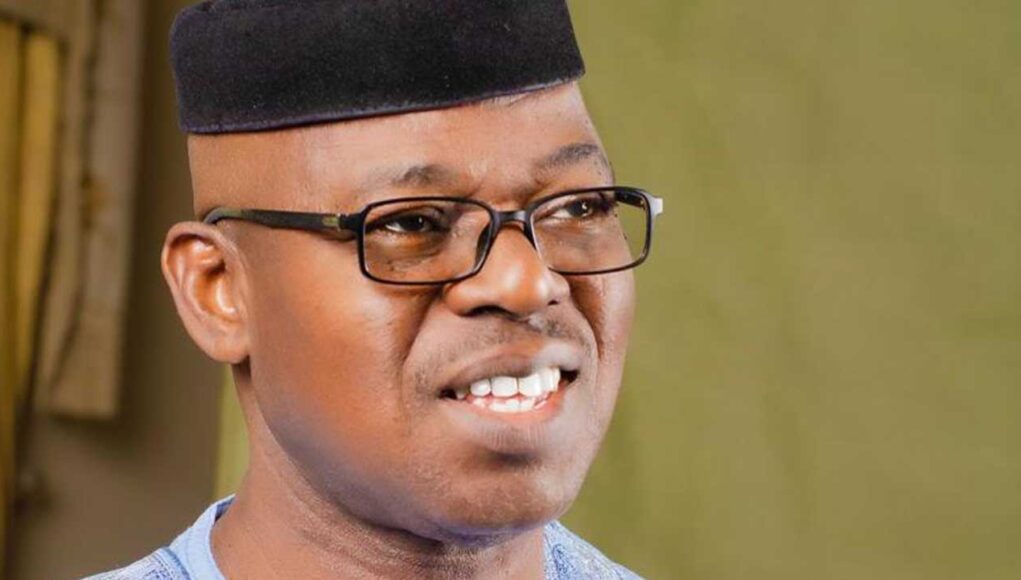 At the end of Saturday’s governorship election in Ekiti State, the State Returning Officer and Vice Chancellor of the University of Ibadan, Prof Kayode Adebowale, declared Biodun Oyebanji of the All Progressives Congress (APC) winner of the election with 187,057 votes, while Chief Segun Oni of the Social Democratic Party (SDP), came distant second, polling 82,209 votes and Bisi Kolawole, the governorship candidate of the PDP coming third with 67,457 votes.
At the end of Saturday’s governorship election in Ekiti State, the State Returning Officer and Vice Chancellor of the University of Ibadan, Prof Kayode Adebowale, declared Biodun Oyebanji of the All Progressives Congress (APC) winner of the election with 187,057 votes, while Chief Segun Oni of the Social Democratic Party (SDP), came distant second, polling 82,209 votes and Bisi Kolawole, the governorship candidate of the PDP coming third with 67,457 votes.
While Oyebanji trounced his co-contestants in 15 out of 16 councils, Kolawole led only in his Efon local government area. In fact, Oni was humbled in his Ido/Osi council, where APC got 10,321 and SDP 9,321.
Although many people in the state have described the resounding victory as a referendum on Governor Kayode Fayemi’s achievements in managing the resources of the state and integrating Ekiti into national politics, some observers attributed the outcome to the unresolved crisis in the PDP after its governorship primary that forced Oni and his supporters to quit the party and join SDP, a relatively unknown party in Ekiti.
Besides, some analysts said monetary inducement of voters played significant roles in determining the result of the election. Though, they acknowledged that all the major political parties engaged in vote buying but ‘the highest bidder’ laughed last. Indeed, they dismissed the whole process as a “caricature of democracy.”
Unknown to many, the Ekiti election had been won and lost on the day Oni left PDP and the choice of Fayemi to support the aspiration of his former Secretary to the State Government, Oyebanji in his quest to succeed him.
Investigation by The Guardian revealed that APC leaders played more than a passive role in ensuring that Oni did not get PDP ticket, because they saw him as the only stumbling block on their way to retaining power in the state.
Oni is not a stranger to Ekiti politics. He contested against Fayemi in 2007 under the platform of PDP and ‘won’ but the protracted legal tussle lasted till October 15, 2010 when the Appeal Court, sitting in Akure, gave the verdict and declared Fayemi actual winner of that election.
He left the party to join APC when Fayose won the primary ahead of 2014 election, citing incompatibility with Fayose’s style of politics and rose to the position of APC Deputy National Chairman (South). Oni contested APC governorship primary with Fayemi in 2018 and lost but he challenged the internal election in court, against party decision. By the time the court gave judgment against him, he was dismissed by the state chapter of the party.
To realise his political ambition, he returned to the PDP where former governor Ayodele Fayose worked with Senator Biodun Olujimi to not give him any breathing space. All entreaties by the national leadership of the party to get Oni integrated into the party system were frustrated by Fayose and Olujimi.
However, unknown to Olujimi, Fayose’s game plan was more than what was visible to her. Despite her ambition to fly PDP governorship ticket, Fayose foisted Kolawole on the party, while Oni defected to SDP.
But what many observers see as Fayose’s folly did not immediately translate into APC’s victory, until the choice of Oyebanji by Fayemi. It was gathered that when the race for Fayemi’s successor began, no fewer than 10 aspirants gave the idea a shot, including Senator Opeyemi Bamidele, Hon. Femi Bamishile, three of Fayemi’s close aides, current Commissioner of Justice and Attorney General of the state, Wale Fapounda SAN, Fayemi’s former Chief of Staff, Biodun Omoleye and Oyebanji.
It was gathered that at the point of taking decision, the powers that be, especially members of the committee that fought for the creation Ekiti, where Oyebanji served as the Secretary, preferred him to succeed Fayemi. They saw Oyebanji as one of their own, who has the grasp and knowledge of the Ekiti project.
It was also said that many traditional rulers and elders in the state saw Oyebanji as a homegrown politician, who speaks their language and will tailor development according to their needs. In fact, an elder of the state was quoted to have said that “if Oyebanji had not worked for the success of the creation of Ekiti, what would his co-contestants have been fighting for.
It was also an open secret that wife of the governor, Erelu Bisi Fayemi, did not hide her preference for Oyebanji’s aspiration and led women in the party to campaign for his victory.
The governor-elect, who was the Chief of Staff to the first civilian governor of the state and current Minister of Trade and Commerce, Otunba Niyi Adebayo, also served as Commissioner for Integration and Inter-Governmental Affairs and Head of Ekiti State Office of Transformation Strategy and Delivery (OSTD) during Fayemi’s first term in office.


















































